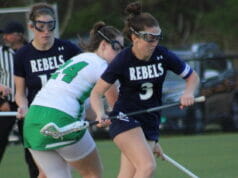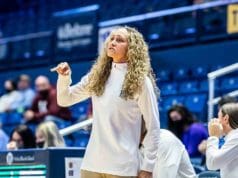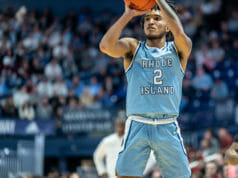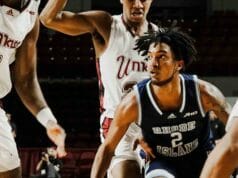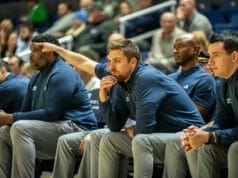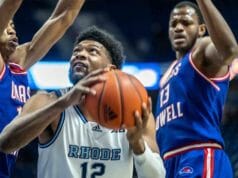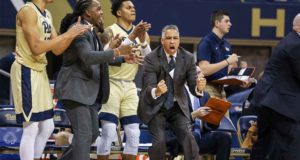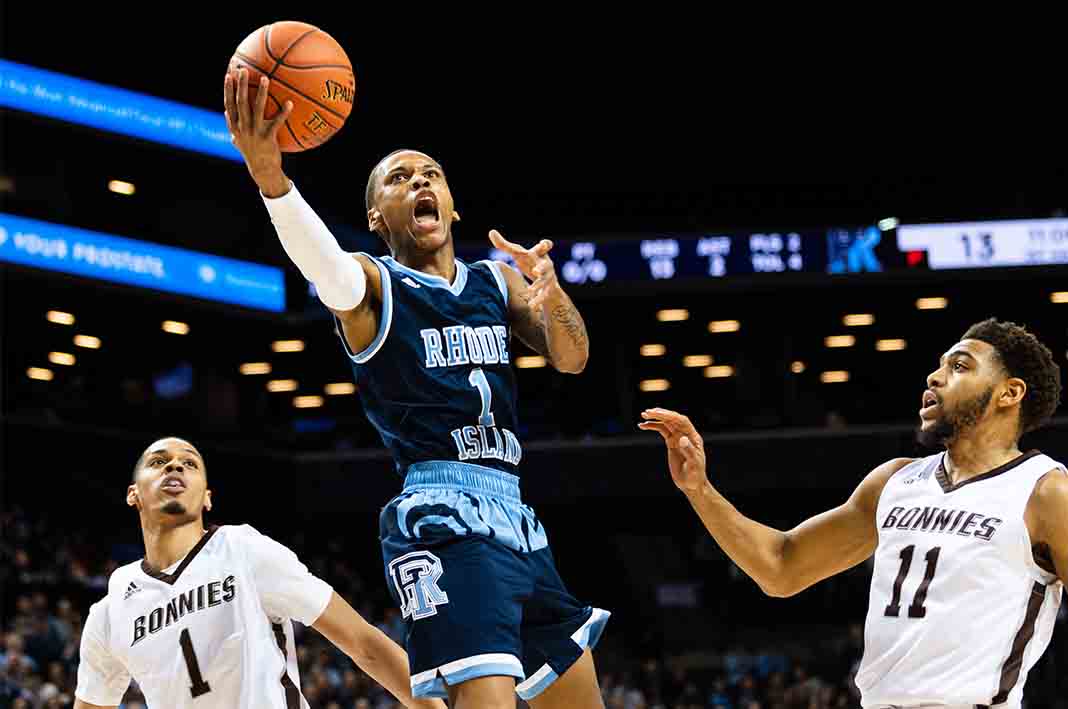
Cliches are everywhere in sports and life. One oft-used is “next man up,” referring to a situation where either a player is injured and another must step in or, at times, in a general program sense where seniors graduate and others fill their shoes.
At the conclusion of 2017-18, Rhode Island graduated four guards who helped lead them to back to back NCAA Tournaments. All went on to play professionally in some capacity. Fatts Russell was the “next guard up” last season, expected to transition from a 17.9 minute per game energy-inducing freshman to a nightly producing sophomore. The unvarnished truth is that it was a challenge.
Russell averaged 14.2 points, 2.7 rebounds and 3.7 assists per game, and battled through adjusting to the new role throughout the year. He saved his best ball for late in the season, increasing his shooting percentage to nearly 43% over the final seven contests and, more critically, rediscovering the foundation of swagger that is central to his game.
Here, we talk about that and much more with the rising junior…
Chris DiSano: We’ll discuss the summer and what’s going on these days, but let’s take a step back and reflect first. Last season, you stepped into a new role as a 30-plus minute per game player, a guy who was near the top of opponent’s scouting report, a guy with significant expectations upon him. Looking back, what was the most difficult part of that adjustment for you?
Fatts Russell: Yeah, I’d say the most difficult part of it was the psychological aspect of having a bad game and just dealing with it — emotionally and mentally. I felt like towards the end of the season I started getting the hang of it I guess. I started maturing more. I felt in the beginning of the season I was immature with how I dealt with that, but the tough times helped me mature and grow as a man. That was the biggest adjustment, the mental one.

FR: Coming in my freshman year, it didn’t matter what I did, honestly. I’d go out there and people would hope I’d do something great… but if I didn’t, it didn’t matter. Now, in my second year, I step into a role and people are looking for me to perform and all eyes were on me on the court. So it took a lot mentally.
E.C. Matthews and Jared Terrell told me it would happen. But me being my confident and sometimes cocky self, I thought I was ready to handle it. But it came fast. It helped me to grow up and learn that you have to be ready for these situations, not just basketball-wise (skills), but mentally.
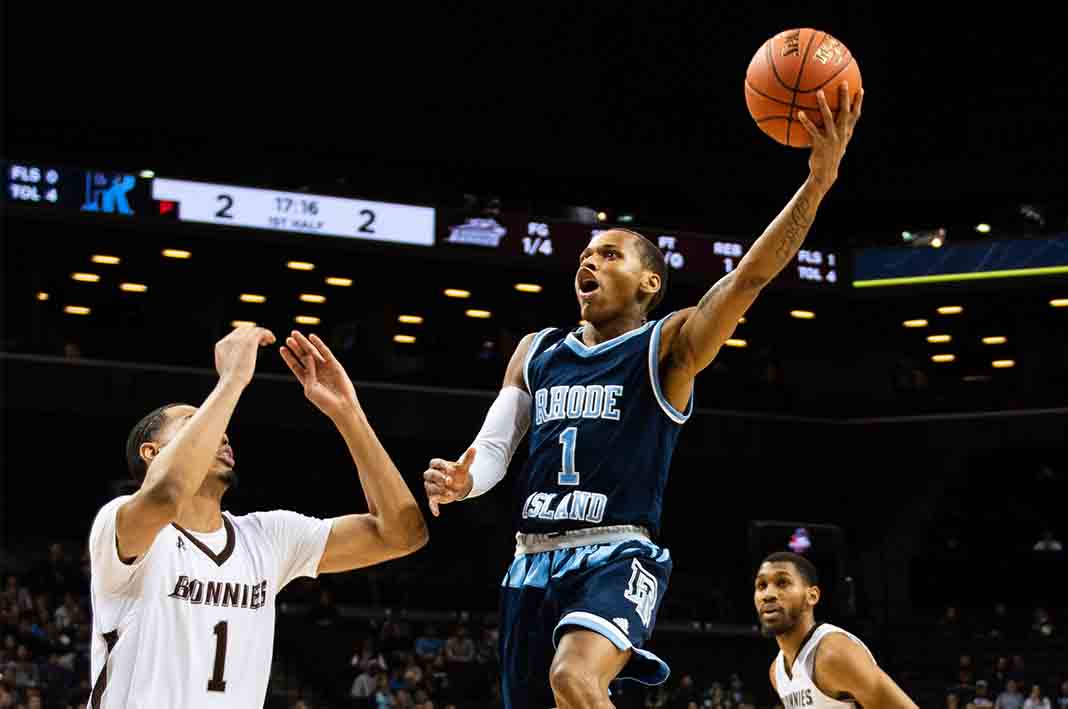
CD: Your shooting percentage last year improved as the year went on after a really tough start. Maybe it’s the mental aspect, rhythm, a host of possibilities… To what do you attribute your improvement?
FR: My shooting percentage was really mental. At the beginning of the season, mentally I just wasn’t right and it messed with me. That’s why I went through a phase of six or seven games where I couldn’t throw a rock in the ocean. But me being as confident as I am and rediscovering that killer mindset, helped me break out of it and getting back to my rhythm.
CD: Let’s shift to the coaching staff and team. What did you learn about David Cox in the head coach’s role that was different or that you didn’t see from him in his assistant/associate head coach role?
FR: I learned he has a lot of fire in him (laughs). When he was an assistant he was the calm guy and the person you could always go and talk to. You still can still do that and he’s still calm overall, but he has a fire that I didn’t see until he became the head coach.
CD: Last year through a large stretch in February the team was reeling. You were able to pull it together and go on a six-game winning streak before the year ended in the A-10 semifinals. What changed and allowed the team to flip the switch?
FR: There were several reasons and, not to sound like it’s all about me, but I think it started with me to a degree. I had to figure out how to get over myself for the betterment of the team. As my coaches, my family, and my teammates – who I owe all the credit to for sticking with me – helped me through that tough time, we told each other we were going to make a run and did. It didn’t go out the way we wanted it to with an A-10 Tournament Championship, but we made a good run.
CD: How did that end of the season run help everyone?
FR: It helped us all with our confidence, showing us that we’re one of the best teams in the A-10, if not the best one. If we put the work in and get better moving forward, who knows what can happen. And I think it helped excite and give our fans confidence about the team heading into this upcoming season.
CD: Right now what’s the main part of your game you’re working on in the off-season?
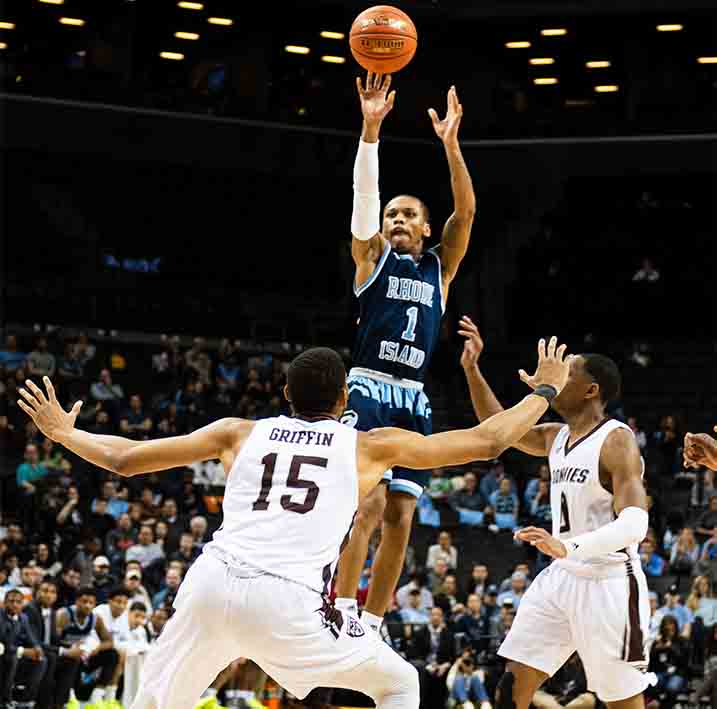
FR: I’m trying to gain more weight and for the basketball aspect of it, I’m working to become a more consistent shooter. I know I can shoot it. Just being more consistent with it and shooting the same shot every time I shoot it.
CD: How are workouts going and what’s been the focus? What are some observations that stand out to you?
FR: Workouts are going really good. Guys are getting stronger, faster, and games are expanding. The thing I really like is how we’re competing against each other. We’re not being friendly on the court with each other, we’re challenging each other, getting physical and competing. That’s a really good thing to get ready for the competition we’re going to face. We have a really tough schedule and we need to be ready for that.
CD: Yes, you definitely do. I wasn’t going to ask about that until we connected closer to the season, but since you went there I will too. It’s littered with big time challenges, so you must be looking forward to that.
FR: I can’t wait. Especially if we have aspirations to play at the next level we have to play against the best teams and show what we can do. So I can’t wait for this opportunity.
CD: Is there one particular game, whether Alabama, Maryland, West Virginia, or another that you have circled?
FR: Yeah, Providence (laughs).
CD: Good answer. Let’s pivot, what’s your take on the freshmen as a group so far in getting their feet wet?
FR: They’re a talented group. They have a huge upside and will one day make a real impact.
CD: There are a couple of talented transfers as well in Antwan Walker (via Georgetown) and Jeremy Sheppard (via East Carolina/College of Central FL) joining this program. Being up close with them as you are, can you isolate one part of each player’s game that he does well and share?
FR: Well, for Antwan Walker, he is a heck of an athlete. Rebounding, catching lobs, and impacting the game with his activity above the rim. Jeremy is a heck of a shooter. Every time he shoots it I think it’s going in.
CD: You talked about the A-10 briefly earlier, but the A-10 – we both know – is going to be stronger this year. Many of the top teams are returning all or almost all of their firepower. Who do you enjoy competing against the most in the A-10 and which visiting arena (maybe Saint Joe’s after last year) is most fun to play in?
FR: I’d say competing against VCU, because they make the game so tough for us. The way they compete on defense and I feel like we have a little rivalry with them, so that game’s always fun to play in. As far as road arenas, I like playing at Dayton. They always have a nice atmosphere.
CD: You’re still a Lakers fan, right? What’s your take on the Anthony Davis trade?
FR: I love Anthony Davis. I’m not a huge Lebron fan, that’s the thing, but I love Anthony Davis and I’m happy for him.
CD: Let’s wrap with this one… You have a few months before the season is upon us. What are your goals as you try to finish the off-season/preseason strong and hit the ground running. How about team goals?
FR: Next year, I want to be the most outstanding player in the A-10. For the team, it’s nothing short of winning the Atlantic 10 and making the NCAA Tournament again. We just need to stick together like toward the end of last year when we really began to bond; we need keep together and play for each other.


